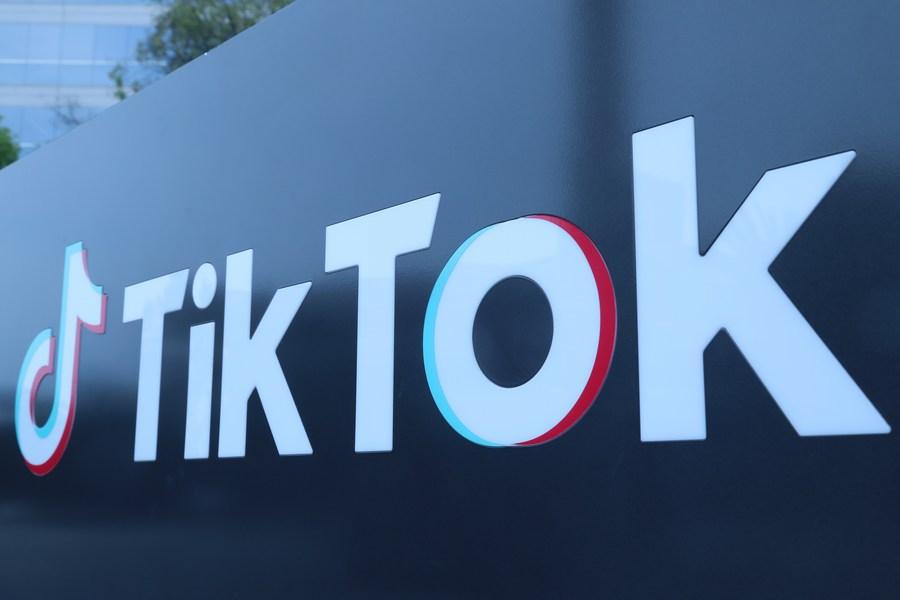
 0 Comment(s)
0 Comment(s) Print
Print E-mail Xinhua, March 15, 2024
E-mail Xinhua, March 15, 2024

This photo taken on Aug. 21, 2020 shows a logo of TikTok's Los Angeles Office in Culver City, Los Angeles County, the United States. [Photo/Xinhua]
The U.S. House of Representatives on Wednesday passed a bill which could potentially lead to the nationwide ban on short-video app TikTok, citing unfounded national security concerns due to its Chinese ownership.
The move has drawn widespread criticism from various quarters both within and outside the United States, with people questioning the motivations behind Washington's suppression of the popular app, and raising concerns about constitutional rights and the principle of fair competition being violated.
Devastating consequences
The bill, which still needs passage in the Senate to become law, would prohibit TikTok from U.S. app stores unless the social media platform -- used by roughly 170 million Americans -- is spun off from its parent company ByteDance. The bill gives ByteDance, which allegedly raises security risks for the United States, roughly five months to sell TikTok.
If divestiture is not achieved by that time, it will be illegal for app store operators such as Apple and Google to offer the app for download.
The proposed TikTok ban under the guise of national security has faced backlash from the company and its vast user base. TikTok has vehemently opposed the legislation, denouncing it an infringement on the constitutional right to freedom of expression.
"This process was secret and the bill was jammed through for one reason: it's a ban," the company said in a statement Wednesday. "We are hopeful that the Senate will consider the facts, listen to their constituents, and realize the impact on the economy, 7 million small businesses, and the 170 million Americans who use our service."
In a video posted on X (formerly Twitter) Wednesday responding to the House's vote, TikTok CEO Shou Zi Chew said the company has invested in keeping user "data safe and our platform free from outside manipulation."
He warned that if the bill is signed into law, it will impact hundreds of thousands of American jobs and take "billions of dollars out of the pockets of creators and small businesses."
"We will not stop advocating for you, and we will continue to do all we can, including exercising our legal rights to protect this amazing platform we have built for you," Chew said.
The TikTok community, particularly content creators and small business owners who have thrived on the platform, fear for the devastating consequences of a ban.
Entrepreneurs like Callie Goodwin, who launched her greeting card company on TikTok, and Tiffany Yu, a disability advocate, have shared how TikTok has been instrumental in building communities and amplifying underrepresented voices. The potential ban threatens not just their livelihoods but also the rich tapestry of connections and expressions that TikTok fosters.
"Singled out" for being Chinese
Critics, including technology and cybersecurity experts, have pointed out that banning TikTok does little to enhance the security of American users and may instead be seen as a move to stifle competition against American social media giants.
In a story carried by www.vox.com, Casey Fiesler, an associate professor at the University of Colorado Boulder, highlighted the lack of nuanced understanding among policymakers regarding TikTok.
Concerns U.S. lawmakers cited to impose the ban, such as content moderation, algorithmic unfairness, and data privacy concerns, are prevalent across all social media platforms, said Fiesler, who herself has nearly 115,000 followers on TikTok.
"The thing that's unique to TikTok is their relationship to China, which is what makes them concerned about those particular things, I guess." she added.
Prominent dissidents within Congress, such as representative Jamaal Bowman, a savvy TikToker himself, have also spoken out against the ban, arguing it constitutes an attack on freedom of speech, reported USA TODAY.
Bowman urged Congress to question why TikTok is the only platform being scrutinized by Congress while most agree that all social media causes some harm.
"We're isolating TikTok and singling them out," Bowman said in an interview with USA TODAY. "And they are no worse or better than any of the other social media platforms who have committed blatant, egregious violations in terms of impact on our society and democracy."
Both the American Civil Liberties Union and the Foundation for Individual Rights and Expression have urged solidarity against a TikTok ban, arguing the move would raise serious First Amendment concerns and almost certainly face legal action. A similar attempt by the Trump administration to ban TikTok in 2020 was thwarted by the courts.
Fair competition in peril
The proposed TikTok ban has also sparked an international outcry, with many seeing it as an extension of the U.S.-initiated tech war with China that undermines the principles of free trade and fair competition.
Critics have contended that the principle of fair competition is fundamental to innovation and consumer choice. When governments target specific companies based on their country of origin rather than their actions, it sets a dangerous precedent that could stifle global technological advancement.
Moreover, using national security as a blanket justification for economic actions against specific foreign companies undermines the trust that's crucial for international trade, they say.
The unfounded suppression of TikTok underlines the need for a more nuanced understanding of digital geopolitics and a recommitment to principles that ensure a level playing field for all participants in the global digital economy, according to the critics.
The bill puts the United States on the opposite side of the principle of fair competition and international economic and trade rules, said Chinese foreign ministry spokesperson Wang Wenbin on Thursday.
If so-called "national security" excuses can be used to arbitrarily suppress outstanding companies of other countries, then there is no fairness to speak of, he added.